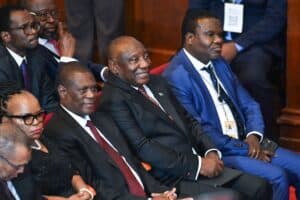Whatever power base the president can craft with cabinet appointments, something else entirely is happening at party HQ.

Despite a show of force at his inauguration, President Cyril Ramaphosa’s grip on power remains under threat. Dissent festers within the governing party.
The spectacle of a full battalion, with breathtaking fly-pasts by the SA Air Force, was designed to remind pretenders that there is only one commander-in-chief. And he doesn’t wear red overalls. Yet the political war games are far from over. The “Fightback” slogan, given new life by the Freedom Front Plus, is appropriate inside the ANC.
Jacob Zuma, Public Protector Busisiwe Mkhwebane, ANC deputy president David Mabuza, and party secretary-general Ace Magashule are all challenging Ramaphosa’s authority. The shake-up in state security derives from the same internal power struggle.
On Friday, Bob Mhlanga, special adviser to former state security minister Dipuo Letsatsi-Duba was suspended, three weeks after another ministerial adviser, Gibson Njenje, was fired. Both Mhlanga and Njenje are long-time Zuma supporters. Dismissed during Thabo Mbeki’s tenure, they were brought back by Zuma, to whom they remain loyal. And Zuma has not given up.
On Friday, outside the KwaZulu-Natal High Court in Pietermaritzburg, where he is trying to fend off corruption charges, he warned those pursuing him. Claiming he couldn’t attend the inauguration, “because I am busy here, trying to stay out of jail”, Zuma threatened, not for the first time, to expose his detractors.
Any such exposure would be assisted by his state security contacts. Who are they? There have been allegations about Mkhwebane’s state security connections during Zuma’s term.
The timing and nature of her finding against Pravin Gordhan on Friday perfectly fit the Zuma/Magashule fightback campaign. No matter how feeble her case, and even with her reputation damaged by court judgments, Mkhwebane was able to use her office to cast doubt on one of the country’s most outspoken opponents of corruption.
She also helped stall Ramaphosa’s announcement of who would be in his cabinet. Much is being read into Mabuza’s request to delay his own swearing in as member of parliament. Whatever his intention, Mabuza’s move also contributed to the cabinet announcement delay.
In addition, it raised questions about the power relationship between Ramaphosa and Mabuza. Without Mabuza’s support, Ramaphosa would not have been elected ANC president in December 2017. Mabuza, too, has presidential ambitions. He does not want to be thwarted by the ANC’s integrity committee, which is subservient to the national executive committee (NEC). He has exposed the integrity committee as having no teeth.
Ramaphosa once publicly referred to Magashule as his real boss. Magashule has not returned the compliment. Nor has he retracted his comment that the ANC’s May 8 election victory was due to collective party leadership, not to Ramaphosa.
ALSO READ: Ramaphosa calls Ace Magashule his ‘boss … without him I am nothing’
Whatever power base Ramaphosa can craft with cabinet appointments, something else is happening at party headquarters, Luthuli House, where Magashule is effectively chief executive officer. That’s where the power lies.
In the modern era, soldiers marching on a rugby field, and planes thundering overhead may still symbolise power. But they do not wield it. Whoever controls Luthuli House and the NEC will call the shots. Who is that?
Martin Williams, DA councillor and former editor of The Citizen.
For more news your way, download The Citizen’s app for iOS and Android.






